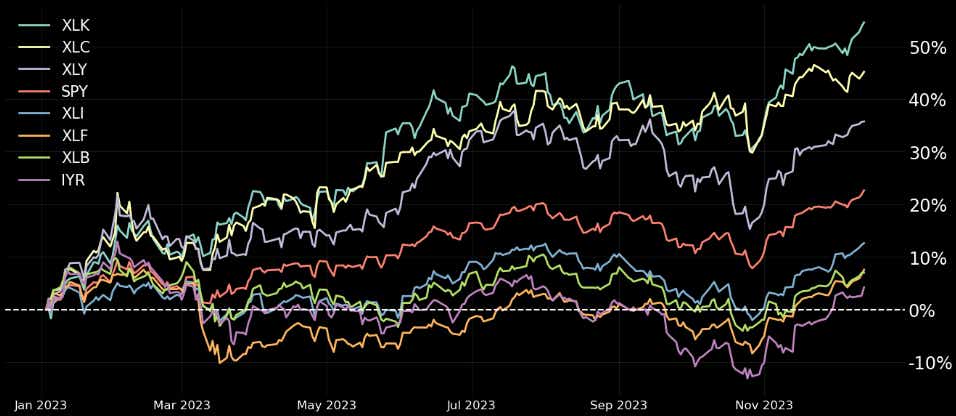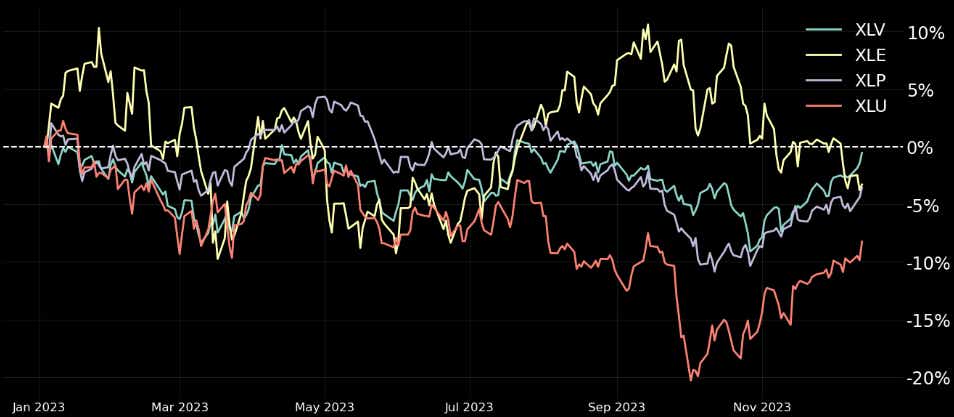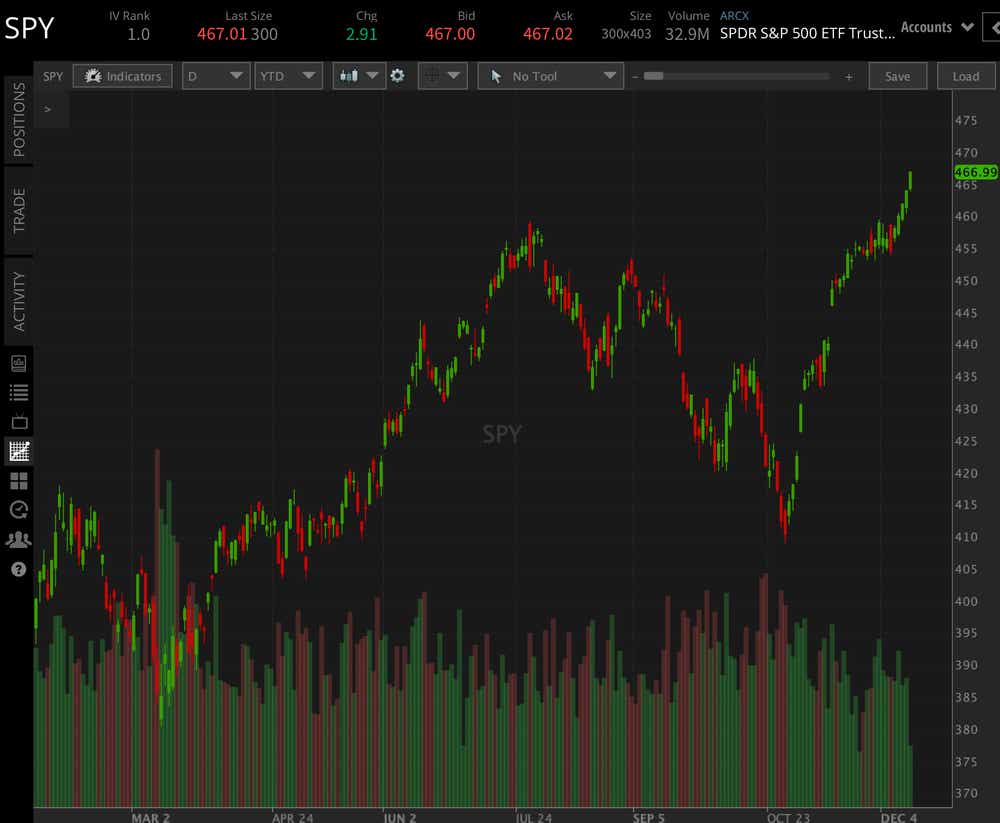Best & Worst S&P 500 Sectors of 2023

Best & Worst S&P 500 Sectors of 2023
By:Mike Butler
We are looking at the best and worst performing sectors and stocks of the S&P 500 in 2023. Which stocks outperformed in 2023?
- The S&P 500 is a stock market index that's widely considered the benchmark for stock market performance year over year.
- The S&P 500 is up over 20% year-to-date in 2023.
- The best performing sector in the S&P 500 this year was technology.
- The worst performing sector in the S&P 500 this year was utilities.
What is the S&P 500?
The S&P 500, otherwise known as the Standard and Poor's 500, is a stock market index that tracks the performance of the 500 largest companies listed on stock exchanges in the United States.
Many consider the S&P500 the "benchmark" of stock market performance year to year, simply because it encompasses so many different sectors. Unlike the Nasdaq, which is primarily tech and growth stock exposure, the S&P 500 ranges from energy, to healthcare, to financial, and even real estate sectors.
The S&P 500 can be directly traded with the S&P 500 ETF (SPY), the S&P 500 e-mini futures (/ES), or the cash-settled S&P 500 Index (SPX).
What sectors make up the S&P 500?
There are 11 sectors in the S&P 500, which is why there is such balanced exposure relative to other indices that are more condensed in market exposure. The chart below highlights the year-to-date (YTD) performance of each sector's ETF, in order of best performing to worst performing sector.
The S&P 500 ETF (SPY) is on the chart to show relative strength for other sectors—the ETF is right in the middle of the pack relative to other specific sectors it contains.

Bullish sectors
XLK - Technology
The technology sector is up over 50% for the year to date, with the surge in AI demand, as well as strong earnings growth from some of the magnificent seven stocks—Apple (AAPL), Nvidia (NVDA), and Microsoft (MSFT). We can't forget about Adobe (ADBE), who reports earnings on Dec. 13 after the market closes. These high-flying tech stocks have greatly contributed to the overall performance of the S&P 500 in 2023.
XLC - Communications
The communications sector is up over 40% YTD, with stocks such as Meta (META), Google (GOOGL), and Netflix (NFLX) leading the charge for the S&P 500 communications gains on the year.
XLY - Consumer discretionary
The consumer discretionary sector is up over 30% YTD. This sector includes products like Amazon (AMZN), McDonalds (MCD), Home Depot (HD), and Lowe's (LOW).
XLI - Industrial
The industrial sector is up over 10% YTD, and includes companies like General Electric (GE), Boeing (BA), Caterpillar (CAT), and United Parcel Service (UPS).
XLF - Financial
The financial sector is up just under 10% YTD and includes your classic banking and finance companies like JPMorgan Chase (JPM), Visa (V), Mastercard (MA), and Bank of America (BAC).
XLB - Materials
The materials sector is up just under 10% YTD, and this sector includes companies like Linde PLC (LIN), Sherwin-Williams (SHW), Air Products & Chemicals (APD), and Freeport-McMoRan (FCX).
IYR - Real Estate
The real estate sector is the final S&P 500 sector that posted a gain of about 5% in 2023 so far. This sector includes companies like Prologis (PLD), American Tower Corp (AMT), and Equinix (EQIX).

Bearish sectors
XLV - Healthcare
The healthcare sector has had a choppy 2023 and is the first S&P 500 sector that has a loss of just under 5% so far in 2023. This sector contains companies like UnitedHealth Group (UNH), Eli Lilly and Co (LLY), Johnson & Johnson (JNJ), and Merck (MRK).
XLE - Energy
The energy sector has dipped into the red in the past few months with the big selloff in Oil and Natural Gas products. XLE is down about 5% on the year now, and includes products like Exxon Mobil (XOM), Chevron (CVX), EOG Resources (EOG), and ConocoPhillips (COP).
XLP - Consumer staples
The consumer staples sector is down about 5% on the year and includes products like Proctor & Gamble (PG), Costco (COST), PepsiCo (PEP), Walmart (WMT), and Coca-Cola (KO).
XLU - Utilities
The utilities sector is the worst performing S&P 500 sector in 2023, down about 10% YTD. This sector contains companies like NextEra Energy (NEE), Southern Co (SO), Duke Energy Corp (DUK), and Sempra (SRE).
S&P 500 performance in 2023
The S&P 500 ETF (SPY) has had a stellar 2023, opening the year at $384.37 and rallying to a new all-time high of $470.10 on Dec. 13. SPY is up over 20% year-to-date, which is impressive considering the inflation, recession, and global worries we've endured through the year.

Best S&P stocks in 2023
Plenty of tech giants took off in 2023 with the artificial intelligence craze, but a few surprises made the notable performance list for the S&P 500. Here are the top five, ranked by gains:
- Nvidia (NVDA), 138%
- Meta Platforms (META), 122%
- Palo Alto Networks (PANW), 109%
- Royal Caribbean Group (RCL), 88%
- Advanced Micro Devices (AMD), 83%
Worst S&P stocks in 2023
As you might imagine, there were a handful of products that took a nose-dive during 2023. Covid vaccine products are near the top of the list. Here are the five worst performers, ranked by losses:
- Moderna (MRNA), -61%
- Enphase Energy (ENPH) - (54%)
- Dollar General (DG) - (48%)
- Pfizer (PFE) - (42%)
- Walgreens Boots Alliance (WBA) - (36%)
Stay tuned for more 2023 reviews, and 2024 outlooks on the News & Insights tab.
Mike Butler, tastylive director of market intelligence, has been in the markets and trading for a decade. He appears on Options Trading Concepts Live, airing Monday-Friday. @tradermikeyb
For live daily programming, market news and commentary, visit tastylive or the YouTube channels tastylive (for options traders), and tastyliveTrending for stocks, futures, forex & macro.
Trade with a better broker, open a tastytrade account today. tastylive, Inc. and tastytrade, Inc. are separate but affiliated companies.
Options involve risk and are not suitable for all investors. Please read Characteristics and Risks of Standardized Options before deciding to invest in options.
tastylive content is created, produced, and provided solely by tastylive, Inc. (“tastylive”) and is for informational and educational purposes only. It is not, nor is it intended to be, trading or investment advice or a recommendation that any security, futures contract, digital asset, other product, transaction, or investment strategy is suitable for any person. Trading securities, futures products, and digital assets involve risk and may result in a loss greater than the original amount invested. tastylive, through its content, financial programming or otherwise, does not provide investment or financial advice or make investment recommendations. Investment information provided may not be appropriate for all investors and is provided without respect to individual investor financial sophistication, financial situation, investing time horizon or risk tolerance. tastylive is not in the business of transacting securities trades, nor does it direct client commodity accounts or give commodity trading advice tailored to any particular client’s situation or investment objectives. Supporting documentation for any claims (including claims made on behalf of options programs), comparisons, statistics, or other technical data, if applicable, will be supplied upon request. tastylive is not a licensed financial adviser, registered investment adviser, or a registered broker-dealer. Options, futures, and futures options are not suitable for all investors. Prior to trading securities, options, futures, or futures options, please read the applicable risk disclosures, including, but not limited to, the Characteristics and Risks of Standardized Options Disclosure and the Futures and Exchange-Traded Options Risk Disclosure found on tastytrade.com/disclosures.
tastytrade, Inc. ("tastytrade”) is a registered broker-dealer and member of FINRA, NFA, and SIPC. tastytrade was previously known as tastyworks, Inc. (“tastyworks”). tastytrade offers self-directed brokerage accounts to its customers. tastytrade does not give financial or trading advice, nor does it make investment recommendations. You alone are responsible for making your investment and trading decisions and for evaluating the merits and risks associated with the use of tastytrade’s systems, services or products. tastytrade is a wholly-owned subsidiary of tastylive, Inc.
tastytrade has entered into a Marketing Agreement with tastylive (“Marketing Agent”) whereby tastytrade pays compensation to Marketing Agent to recommend tastytrade’s brokerage services. The existence of this Marketing Agreement should not be deemed as an endorsement or recommendation of Marketing Agent by tastytrade. tastytrade and Marketing Agent are separate entities with their own products and services. tastylive is the parent company of tastytrade.
tastyfx, LLC (“tastyfx”) is a Commodity Futures Trading Commission (“CFTC”) registered Retail Foreign Exchange Dealer (RFED) and Introducing Broker (IB) and Forex Dealer Member (FDM) of the National Futures Association (“NFA”) (NFA ID 0509630). Leveraged trading in foreign currency or off-exchange products on margin carries significant risk and may not be suitable for all investors. We advise you to carefully consider whether trading is appropriate for you based on your personal circumstances as you may lose more than you invest.
tastycrypto is provided solely by tasty Software Solutions, LLC. tasty Software Solutions, LLC is a separate but affiliate company of tastylive, Inc. Neither tastylive nor any of its affiliates are responsible for the products or services provided by tasty Software Solutions, LLC. Cryptocurrency trading is not suitable for all investors due to the number of risks involved. The value of any cryptocurrency, including digital assets pegged to fiat currency, commodities, or any other asset, may go to zero.
© copyright 2013 - 2025 tastylive, Inc. All Rights Reserved. Applicable portions of the Terms of Use on tastylive.com apply. Reproduction, adaptation, distribution, public display, exhibition for profit, or storage in any electronic storage media in whole or in part is prohibited under penalty of law, provided that you may download tastylive’s podcasts as necessary to view for personal use. tastylive was previously known as tastytrade, Inc. tastylive is a trademark/servicemark owned by tastylive, Inc.